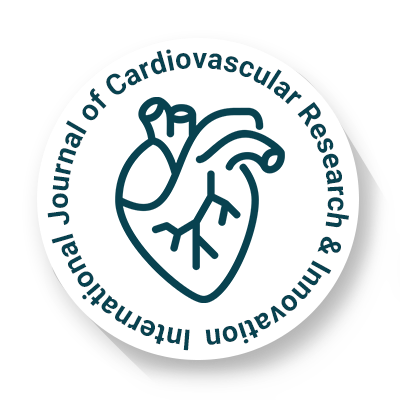
International Journal of Cardiovascular Research & Innovation
OPEN ACCESS

OPEN ACCESS
Regenerative cardiology is revolutionizing cardiovascular medicine by utilizing the body's inherent ability to repair and regenerate damaged heart tissue. Given that cardiovascular diseases remain the leading cause of sickness and death worldwide, the need for novel therapeutic options is more pressing than ever. In contrast to many traditional treatments that focus on alleviating symptoms, regenerative cardiology seeks to restore heart function at both the cellular and molecular levels, offering lasting solutions for individuals with heart conditions.
Regenerative cardiology is centered on an integrated approach that merges stem cell therapy, tissue engineering, and gene editing technologies. Both researchers and clinicians are investigating the opportunities presented by mesenchymal stem cells, induced pluripotent stem cells, and cardiac progenitor cells for the regeneration of myocardial tissue. These innovative cellular therapies hold the potential to assist patients with conditions like myocardial infarction, cardiomyopathy, and congestive heart failure by promoting the regeneration of functional heart muscle and improving vascularization.
In addition to cell-based treatment, bioengineered scaffolds, and 3D bioprinting have emerged as novel approaches to heart tissue engineering. These technologies make it easier to create synthetic heart tissues that mirror the structure and function of native the myocardium, paving the way for bioartificial heart patches and total organ regeneration. The incorporation of biomaterials and growth factors has enhanced cell adhesion and proliferation, thereby supporting the healing process in injured cardiac tissue.
Gene therapy represents a vital and promising area within regenerative cardiology, aiming to fix or substitute faulty genes linked to cardiovascular diseases. Researchers are employing techniques like CRISPR-Cas9 and viral vector-mediated gene transfer to address genetic mutations and enhance the expression of cardioprotective proteins selectively. These genetic approaches hold significant potential for treating inherited heart conditions and for preventing the progression of heart failure.
Moreover, the role of extracellular vesicles and stem cell-derived exosomes is increasingly being recognized for their involvement in intercellular signaling and the regeneration of heart tissue. These nanoscale vesicles contain bioactive elements such as cytokines, proteins, and microRNAs that play a crucial role in modulating inflammation, inhibiting apoptosis, and facilitating angiogenesis in cardiomyocytes. Exploiting the therapeutic capabilities of these extracellular vesicles has the potential to transform treatment for ischemic heart disease and improve outcomes following myocardial infarction.
The effectiveness of regenerative cardiology depends on continual advances in clinical translation, regulatory approvals, and scalable manufacturing methods. Although immunological rejection, ethical dilemmas, and long-term safety concerns persist, continuous research and clinical trials are paving the way for the next generation of cardiovascular medicine. Collaboration among researchers, doctors, and bioengineers is required to tie laboratory findings to practical applications and include regenerative cardiology in routine therapy methods.
As science advances, regenerative cardiology has enormous potential for millions of patients throughout the world. The field is poised to change cardiovascular care by leveraging the body's innate regenerative potential and incorporating the most recent biotechnological advancements. The International Journal of Cardiovascular Research & Innovation is committed to disseminating groundbreaking research and fostering scientific discussion in this crucial area, paving the way for a stronger and healthier future for heart health.